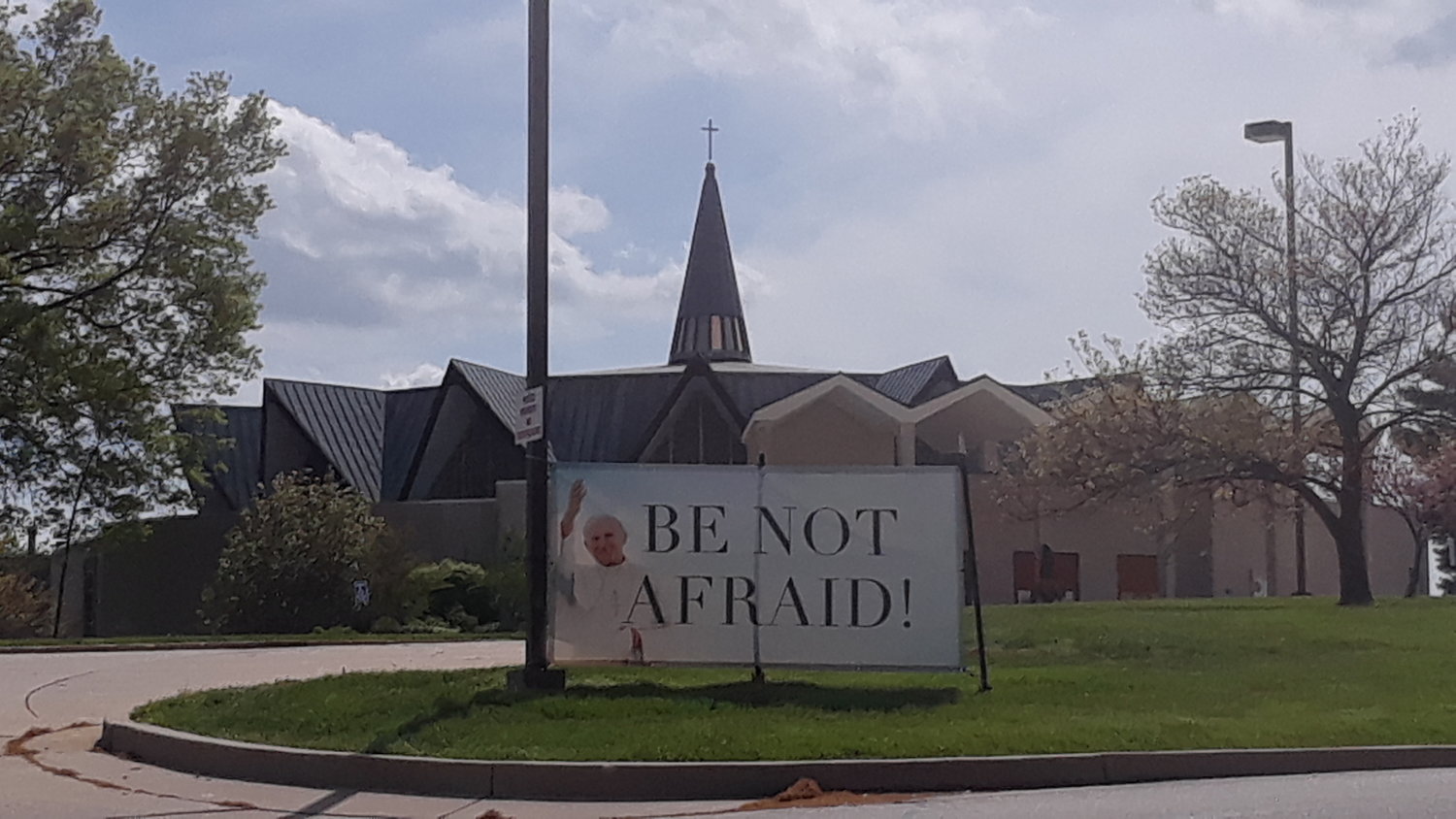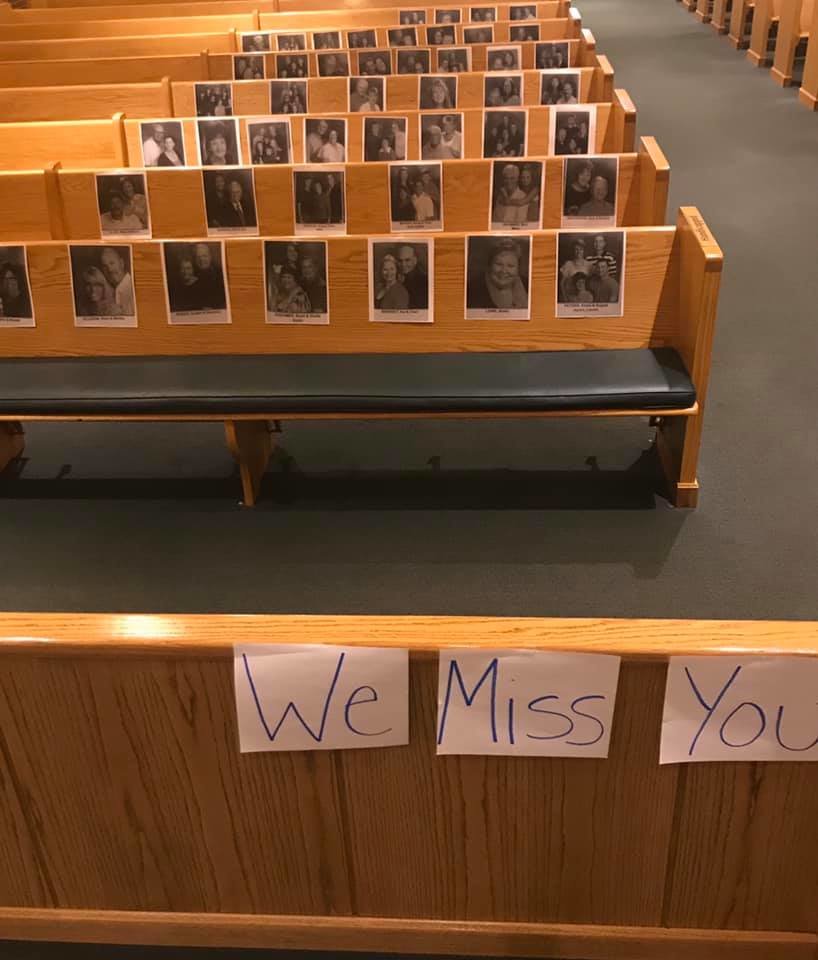Public Masses set to resume under certain conditions
Statewide stay-at-home order scheduled to expire May 3 — Local orders may remain in effect — Social distancing, other safeguards to be vigorously observed — Part of community-wide efforts to protect the vulnerable

CLICK HERE for Frequently Asked Questions about the decrees and instructions.
Public Masses are set to resume after May 3 in the Jefferson City diocese, but it will take time for things to “get back to normal.”
Important safety measures will be required in order to help protect congregants from infection and slow the spread of the COVID-19 virus.
Bishop W. Shawn McKnight handed down official decrees on March 31 and April 17 regarding the pandemic and released specific instructions on April 28 for implementing those decrees after Gov. Mike Parson’s statewide stay-at-home order expires.
Bishop McKnight released the instructions after consulting with fellow bishops in Missouri and with the diocese’s Presbyteral Council, a representative, advisory body of priests.
He said the purpose of the April 28 instruction is to “clarify, elaborate and determine the methods to be observed in fulfilling the current decrees on pastoral activity during the pandemic as we open up our churches to public Masses and other liturgies or devotions.”
The bishop dispensed until June 30 the obligation to attend Sunday Mass for all the faithful of the diocese and all who are present within the diocese’s territorial boundaries.
People who are infected with COVID-19 must not attend Mass or other gatherings at the diocese’s parishes and other entities.
People who are over 65 or are at risk because of an underlying health issue are strongly encouraged not to attend public Masses or other public gatherings at their parish until further notice.
All people, including children, who enter a church must have a face mask or other face covering for their mouth and nose. It must be worn at all times except when they are seated in a pew.
Six feet of distance must be maintained at all times between members of different households, including children. This will mean leaving one or two pews vacant between congregants.
People who cough or sneeze while in church must do so into the elbow of their shirtsleeve.
Celebration of public Masses and other liturgies and devotions cannot take place until after the statewide stay-at-home order expires, scheduled for May 3, and will remain forbidden whenever prohibited by legitimate local governmental authorities.
Once the state’s restrictions are lifted, Masses and other liturgical or devotional activities, as well as public gatherings, may resume within each specified county or region of the state in which such gatherings are allowed, and only when abiding by that authority’s social distancing requirements.
Further safeguards
No one who has exhibited symptoms of COVID-19 or has been exposed to the virus is permitted to enter a church or any parish or school property for 14 days.
Seating at Mass will be limited due to social distancing. Separate doors are to be used for entering and leaving the church.
The Offertory Procession, the Sign of Peace, the holding of hands at the “Our Father,” and the reception of Holy Communion from the chalice will continue to be suspended until further notice.
Hymnals are to be removed from the pews and stored. All frequently touched surfaces are to be sanitized before and after each Mass.
One or more stationary collection baskets are be used rather than the passing of baskets or having ushers take up the collection, and holy water fonts are to remain empty.
Extraordinary Ministers of Holy Communion are to sanitize their hands before and after distributing Holy Communion.
Sacramental life
Eastertime is a season of sacraments.
Candidates and catechumens throughout the diocese have been preparing to be fully initiated into the Church.
Children have been preparing for their First Holy Communion, and young people have been preparing to be sealed with the Holy Spirit in Confirmation.
These sacraments have been on hold since the COVID-19 crisis began.
As of May 4, pastors, administrators and parish life collaborators will begin arranging for the elect and candidates who were anticipating sacraments of initiation at the Easter Vigil to receive those sacraments, unless legitimate local authorities restrict the possibility of public worship services.
“Preference is to be given to celebrating the Sacraments of Initiation at a parish Sunday or Saturday Vigil Mass, following the requirements of social distancing and adapting them as appropriate,” Bishop McKnight stated in his instructions.
First Holy Communions that have been postponed because of the pandemic may be scheduled according to the judgment of the pastor, administrator or parish life collaborator.
No receptions after any Masses are allowed.
Confirmation
Bishop McKnight delegated to all pastors the faculty of administering the Sacrament of Confirmation on candidates in their parishes who have been properly prepared for the sacrament in accordance with diocesan policy, if the scheduled Confirmation by the bishop has been cancelled due to the COVID-19 pandemic.
Confirmation may only be administered at publicly celebrated Masses and in compliance with proper social distancing regulations.
Bishop McKnight encouraged pastors to whom this provision applies to schedule Confirmation at one or more Masses on Pentecost Sunday or its Vigil or at any Sunday or Saturday Vigil parish Mass thereafter.
Other sacraments and gatherings
Bishop McKnight left the possibility of distributing Holy Communion outside of Mass to the judgment of each pastor, administrator or parish life collaborator.
In all cases, the requirements for distributing Holy Communion — such as the use of masks or other face coverings and the sanitizing of hands before and after Holy Communion is distributed — must be observed.
Adoration chapels may be reopened if the pastor, administrator, or parish life collaborator determines that the requirements of social distancing and sanitizing of the facilities can be observed.
In-person parish meetings may take place at the discretion of the pastor, administrator or parish life collaborator, as long as either the six-foot distancing requirement or the use of masks or other face coverings and gloves or frequent handwashing can be observed.
All pastors, administrators and parish life collaborators must continue following the requirements of legitimate state authorities with regard to the pandemic.
Subject to change
If at any time, a legitimate county or state authority resumes a stay-at-home order, “the public celebrations of Mass, liturgies or devotions shall again be expressly forbidden for as long as the legitimate governmental authority determines,” the bishop stated in his decree.
Whenever public celebrations of the Mass and other liturgies and devotions are suspended, private celebrations may take place with no more than the number of people allowed by the county health director or legitimate state official, and only in accordance with social distancing regulations.
When the public celebration of Mass is prohibited, the Anointing of the Sick and the Sacrament of Confession may be offered on an individual basis, as long as the proper protocols communicated in previous decrees are followed.
Wherever and whenever the county health director or legitimate state authority issues a stay-at-home order, Funeral Rites may be celebrated with no more than the number of people allowed by the legitimate state official and only in accordance with the social distancing regulations.
Weddings should be rescheduled to a later date in cases in which the county health director or legitimate state authority issues a stay-at-home order.
However, the bishop stated, “wedding liturgies may take place with no more than the number of people allowed by the legitimate state official and only in accordance with the social distancing regulations.”
Sacrifice and desire
Bishop McKnight pointed out that the purpose of stay-at-home orders, social distancing and other regulations has been to slow the spread of COVID-19 in order to keep it within the capacity of local hospitals and healthcare personnel.
He believes those efforts in this area have been largely successful so far and that various degrees of behavior modification will need to continue into the foreseeable future.
He urged people whose health keeps them from Sunday Mass to participate from home, through the internet, television or radio.
To find links to local parishes’ livestreamed Masses, visit diojeffcity.org and click on “Masses Being Livestreamed.”
The bishop invited all people who are prevented by these circumstances from receiving Holy Communion to receive a Communion of Desire and to continue offering up their temporary loss of this sacrament for all who are sick and all who have died from this pandemic.
“God’s work has continued”
Bishop McKnight’s prayer intention for April was “for a stronger sense of the mission of the Church, especially among our youth and young adults, in this time of pandemic and in our discernment of a new pastoral plan.”
God has been answering that prayer through the engagement of the priests and laypeople of this diocese in ministering to one another and to the community at large through individual and collective works of service.
In coordination with the diocesan Office of Parish and Charitable Services, parishes have organized disaster response teams to work with Church and community organizations to help people affected by COVID-19 and by stay-at-home orders — especially people who are elderly, alone, sick or in need.
Churches throughout the diocese have remained open for private prayer and devotion throughout the suspension of public Masses.
Priests have made themselves available for the Sacrament of Reconciliation and Anointing of the Sick.
“Although our church buildings and schools have been mostly quiet during this time of pandemic, God’s work has continued with great energy and creativity,” Bishop McKnight stated.
“The Holy Sacrifice of the Mass has continued to be offered,” he said. “The sacred ministries of charity, education and faith formation have been carried-out in new, unique and often ingenious ways in our communities.
“As individuals, as parishes, as a diocese and in communion with the Church throughout the world, we continue to look out for and minister to those around us in ways that are both lawful and appropriate,” he said.
All the while, “we all must continue, to the extent we are able, to provide material support for the work of our parishes and to plan for the continued flourishing of our collaborative outreach and concrete charitable ministries, now and beyond this time of pandemic,” the bishop stated.
For more information about the diocese’s response to COVID-19 and to read Bishop McKnight’s decrees and instructions, visit diojeffcity.org/public-health.
Comments
Other items that may interest you
Services
The Catholic
Missourian
2207 W. Main St.
Jefferson City MO 65109-0914
(573) 635-9127
editor@diojeffcity.org







